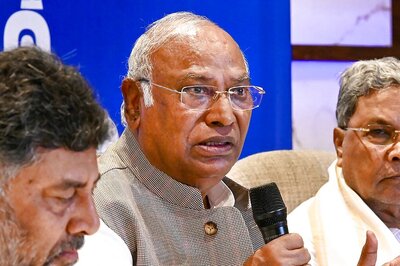
views
In March 2023, Xi Jinping was awarded an unprecedented third term as the Chinese President, amid challenges with the United States (US) and tensions with neighbour Taiwan, marking the beginning of the second decade of his rule. The term put Xi on the path to become the longest serving head of state as China’s rubber-stamp legislature in Beijing, consisting of more than 2,900 lawmakers, vested him with another five years as president. The reappointment was a mere formality as he had already taken over as the Communist Party chief last year.
Five months later, his policies of curbs and control over business giants are being termed as one of the immediate reasons for the economic crisis after Covid.
Many say Xi’s bid to reduce regional disparity and poverty by directly or indirectly damaging his political allies and business tycoons of China has cost the country.
Amid more worrying monthly economic data, the Communist Party mouthpiece, highlighted his speech, which called for patience and resilience in the pursuit of “national rejuvenation".
The five key factors that led to the collapse of China’s economy:
ZERO COVID AFTERMATH
China was relying on the ‘Zero Covid’ approach for a long time to deal with the pandemic, in contrast to other countries, which accepted that they will have to live with the disease. A large majority of the Chinese population was never exposed to the virus like other countries, leading to low levels of immunity. After country-wide anti-government and lockdown protests in China, Xi began relaxing lockdown, putting an end to ‘Zero Covid’, which, in turn, led to a massive resurgence of the infection in the country after three years.
Repeated lockdowns hit the manufacturing and commerce hubs, leading to instability for factories and companies, and this affected employees, employers and industries. It had a cascading effect on consumption, tourism and local supply chains, leading to an overall downturn.
TECH-TONIC SHIFT
Since 2020, Beijing has been going strict on tech giants such as Ali Baba and Tencent to uphold data security and keep national interest over business interest, hitting them with terms such as the “disorderly expansion of capital, savage growth, double reduction and spiritual opium".
“Common prosperity" became the new buzzword of the Communist Party of China (CPC), throwing the tech and private sectors in a state of limbo amid the regulatory crackdown. China made detailed rules to tackle unfair competition and companies’ handling of critical data, citing misuse of consumers’ information and violation of consumer rights.
This has led to mass exodus of giants such as Nike Run Club App, Amazon Kindle e-books, Microsoft-owned LinkedIn and Airbnb, among others.
THE REAL DEAL
China’s real estate drag, which is 59% of the household wealth, is another major reason for the collapse of the economy. As the debt crisis unfolded in mid-2021, companies accounting for 40% of Chinese home sales defaulted, most of them private property developers.
First, builders defaulted with the commitment of delivering the projects and caused public anger. This led to mortgage boycott on developers, supply chains, bankers and government.
The credit polarisation and preference change hit the developers, thus negatively affecting the private sector and causing a complete collapse.
With the poor home rate growth, developers failed to make payments to the banks, leading to a massive increase in non-performing loan (NPL) ratio, which is 11% of the total bank assets.
Also, smaller creditors have moved courts to obtain their payments. E.g. Sunac Holdings and Jiayuan International groups last year moved for winding up petitions. S&P Global Rating said on Wednesday it could adjust its forecast for property sales to a “descending staircase" figure from an “L" shaped recovery, if Country Garden, China’s largest developer, officially defaulted.
LOCAL GOVERNMENT DEBT RISKS
Another factor is the local government debts, which have been on the rise after the Covid pandemic and not been contained so far. Due to the rapid decline in land sale, they are short of money. Local government debts is a third of China’s debt at almost $49 trillion.
The local government debt reached 92 trillion yuan ($12.8 trillion), or 76% of economic output in 2022, up from 62.2% in 2019. Contributing to the debts were local government finance vehicles (LGFVs), which cities used to raise money for infrastructure projects.
JOB MARKET
Another problem is the poor job market. At 21.3%, the unemployment rate for China’s youth aged 16 to 24 reached a record high in June. Almost 10 million youth entered the market last year and it is unlikely that they have all got jobs.
The main reason is insufficient demand from businesses, as they are uncertain about the future, say experts. After the figure hit consecutive record highs in recent months, China suspended the release of monthly data on joblessness among young people.
Meanwhile, the youth may get jobs, but they may not be well-paying or may be far below their skill sets.
Moreover, the rapid urbanisation and service sector jobs are also likely to reduce agricultural labour force by 6%, which will pose another challenge to the economy.
With inputs from agencies

















Comments
0 comment